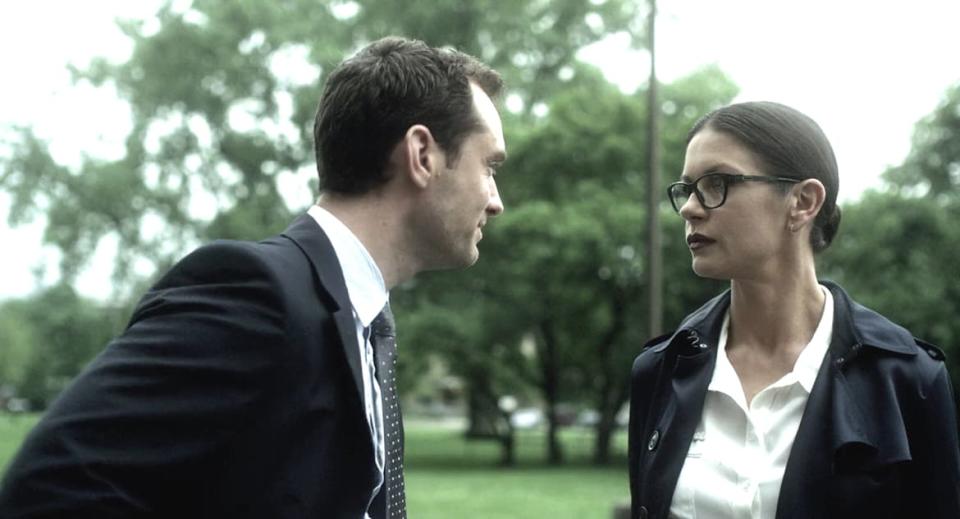Remember When Steven Soderbergh’s ‘Side Effects’ Made Discussing Depression Sexy?

- Oops!Something went wrong.Please try again later.
- Oops!Something went wrong.Please try again later.
- Oops!Something went wrong.Please try again later.
- Oops!Something went wrong.Please try again later.
- Oops!Something went wrong.Please try again later.
It would be easy to take a look at the director of one of the most outwardly steamy film franchises this century and think, “Ah, that guy knows a thing or two about sex!” With the Magic Mike films, Steven Soderbergh ignited an entire generation of horny moms, repressed gays, and good-time guys who just wanted to see a dramedy about hanging with your buds. It’s rare that film can traverse those three highly specific demographics, but that’s what happens when you harness the mesmerizing power of Channing Tatum’s rock-hard nipples.
But the Magic Mike trilogy was simply Soderbergh at his most overt. As a feature film director, Soderbergh has been dissecting sex and sexuality across his entire 34-year, storied filmography. Movies like Magic Mike XXL and 2009’s The Girlfriend Experience—starring pornstar turned actress Sasha Grey—explore sex on a fundamental level; what it means to have it, who wants it, and what they’ll do for it. But things haven’t always been that fundamental.
Side Effects—Soderbergh’s small 2013 thriller about a woman who kills her husband while in an antidepressant-induced sleepwalking haze—quietly meandered into theaters 10 years ago this week. And it toted plenty of unassumingly sexy baggage with it. The film had all of the trappings of a 1990s erotic thriller: Violent crimes of passion, sultry subterfuge, and plenty of twists.
But Side Effects was different. It steered away from the predictability of its genre tropes, in favor of a commentary far sharper than just, “Women can be just as bad as men.” The film was so smart, it was almost prescient. Soderbergh saw the way that the conversation around mental health was changing, and how the influx of social media-based sharing began to lift the veil around antidepressants and SSRIs. Side Effects explored how we trade in secrets, using them as our own powerful, mind-altering tools to get what we want. Somehow, its seduction is even more beguiling a decade later.
Steven Soderbergh Craved One Last ‘Magic Mike’ Lap Dance
Like most Soderbergh films, Side Effects boasts an incredible cast of devious players, including Tatum, working with the director again after Magic Mike catapulted his career to new heights. Tatum isn’t around for long, though. Soon after his character, Martin, is released from a four-year prison stint he served for a little white-collar insider trading, he dies by a knife to the gut from his wife, Emily (Rooney Mara). Except there’s just one problem: Emily awakens to find Martin’s lifeless body, and can’t remember a thing.
Prior to the murder, Emily found herself restless and depressed after Martin’s homecoming. Her despondency comes in short waves—foggy, but potent enough to put Emily so low that she decides to drive her car into a wall. Following her suicide attempt, Emily agrees to see Dr. Jonathan Banks (Jude Law) once a week and start taking a new SSRI called Ablixa, in exchange for him not holding her for a psych evaluation. Ablixa does wonders for Emily’s sleep and sex drive. If only it didn’t also cause those pesky homicidal sleepwalking incidents.

Rooney Mara and Channing Tatum.
Murder while sleepwalking isn’t exactly an impossible tragedy. There have been several cases tried where defendants were acquitted by arguing that they were somnambulant at the time of the death. Emily certainly doesn’t seem like the perfect suspect for murder, and the only thing pointing to her guilt are her prints on the knife and Martin’s dried blood on her feet. There’s no insurance policy for Martin, no history of abuse, and no viable reason for Emily to want him dead. Even Emily’s medical history, with her former Connecticut psychiatrist Dr. Victoria Siebert (Catherine Zeta-Jones), reveals nothing but a model patient.
While all of that is good for Emily, it doesn’t bode well for Dr. Banks, who refused to change Emily’s Ablixa prescription after Martin complained about her first sleepwalking incident. Reporters show up on his doorstep, uncovering allegations about malpractice from a patient in his past, similar to Emily, while an internal investigation leaves him locked out of his swanky Manhattan office. Suddenly, the good doctor is in as compromising of a position as his patient, and neither party is going to come out of this a winner.

Rooney Mara.
Side Effects might sound distinctly Gone Girl-ian in the scope of its mystery, but be assured that Rooney Mara drove her car into a wall so Rosamund Pike could knock herself in the face with a hammer. Soderbergh’s film is so effective because it remains grounded in a believable reality. There is a real-life case to point to in each twisted instance, especially when the film allows the audience to wonder if Emily was treated differently by her psychiatrist because she’s a woman. Soderbergh keeps an undercurrent of commentary about medical malfeasance running throughout the film, alluding not just to the gendered differences in medical treatment but the racial prejudices that permeate healthcare.
Despite those conversations, Side Effects never takes a turn so grave that it can’t juggle its critiques of a fractured system with its script’s innate sensuality. Law and Mara are a perfectly matched doctor-patient dyad. They push and pull on each other with an intensity so smoldering that it remains detectable even in the film’s most narratively complex moments. Mara, in particular, is a joy to watch as she navigates a mystery of her own making, transforming from a kind of archetypal wounded bird into a slinking vulture.

Jude Law and Catherine Zeta-Jones.
For a film that so clearly enjoys toying with its audience, Side Effects makes space to pose legitimate questions about personal healthcare. While its central mystery twirls the viewer around its finger like a lock of tousled hair, Soderbergh and screenwriter Scott Z. Burns are throwing out keen criticisms of the sliminess of Big Pharma and society’s perception of mental illness. It’s a tricky matter to construct a puzzle that skewers drug companies and how doctors operate without falling into a nasty “Medication Is Bad” hole. But Side Effects deftly navigates that tightrope without plummeting into holistic fear-mongering.
‘Magic Mike’s Last Dance’ Is a Sexy-as-Hell, Spellbinding Farewell to the Franchise
Unlike a good amount of the thoroughly adult thrillers that have been released over the last decade, Side Effects attaches social commentary to its narrative with a power drill, not a screwdriver. It’s difficult to extricate the ideas that the movie poses from the film itself. Whereas, if you gaze at something like The Menu or Don’t Worry Darling for too long, their ideas about sexuality as currency and disparity between social classes begin to fall apart. Side Effects has remained so taut because of Soderbergh and Burns’ reluctance to cut corners. They know how to entertain while seering a fascinating critique into their films, so that we can still smell the smoke a decade later. More filmmakers would do well to worry less about rote retreads—updated for the current cultural moment—and care more about crafting keen genre subversions like this one.
At face value, Side Effects’ winding mystery may not seem as sexy as the rippling abs, bulging pecs, and all the other things you’ll find atop a steaming slice of Magic Mike machismo. Channing Tatum’s shirt even remains firmly on his back before a butcher knife goes slashing through it. But Side Effects burns slowly. It has an almost imperceptible sexiness to it, always simmering under the surface. Lies, and the ways we use them to manipulate others and pull them into our suffering, are just as powerful and alluring as the physical body. Duplicity can drive our minds wild with pleasure and pain in equal measure. What could be sexier than a little deception?
Sign up for our See Skip newsletter here to find out which new shows and movies are worth watching, and which aren’t.
Get the Daily Beast's biggest scoops and scandals delivered right to your inbox. Sign up now.
Stay informed and gain unlimited access to the Daily Beast's unmatched reporting. Subscribe now.

